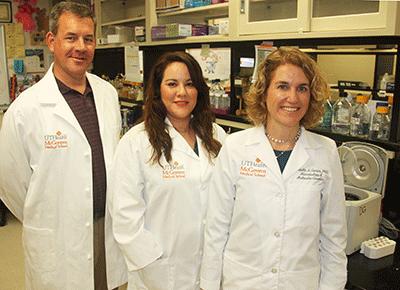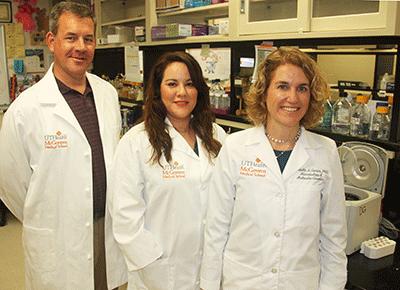
Credit: The University of Texas Health Science Center at Houston (UTHealth)
HOUSTON – (April 10, 2017) – An antimicrobial protein caused a dramatic reduction in the creamy white lesions associated with oral thrush in a preclinical study, report microbiologists with McGovern Medical School at The University of Texas Health Science Center at Houston (UTHealth). Findings appeared in the Proceedings of the National Academy of Sciences.
Oral thrush is a fungal infection of the mouth and throat that affects millions worldwide. Babies, seniors and people with weakened immune systems are particularly susceptible.
"The long-term vision is to develop a new antifungal drug that takes a different approach to treating oral thrush," said Danielle Garsin, Ph.D., the study's co-principal investigator and an associate professor of microbiology and molecular genetics at McGovern Medical School.
Garsin and her collaborator, Michael Lorenz, Ph.D., tested the effectiveness of the antimicrobial protein (EntV) in a mouse model of oral thrush. "The animals who were treated with the protein had far fewer symptoms than the control animals," said Lorenz, a professor of microbiology and molecular genetics at McGovern Medical School.
Because this particular type of fungus – Candida albicans– can develop resistance to medications over time, there is always going to be a need for new antifungals, Lorenz said.
"While thrush is normally not a major problem for patients with normal immune systems, it can be particularly severe and difficult to treat in immunocompromised patients who have been exposed to multiple antifungals and can develop resistant strains of yeast," said Luis Ostrosky-Zeichner, M.D., director of the Laboratory of Mycology Research, professor of infectious diseases and vice-chair of medicine at McGovern Medical School.
"Furthermore, development of new antifungals is encouraging in the face of emerging multidrug-resistant yeasts like Candida auris," said Ostrosky, who is medical director of epidemiology for Memorial Hermann-Texas Medical Center.
Traditional antifungals stop Candida albicans from growing, but do not kill it, which leads to the rise of drug resistance. In contrast, the EntV protein appears to block the ability of Candida to cause disease but does not affect its growth. "The thought is that a treatment that just blocks virulence reduces the incentive for the microbe to evolve drug resistance. That's one of several things that is different about our strategy," Lorenz said.
Post-graduate doctoral student Carrie Graham, M.S., the study's lead author, said EntV blocks the biofilm development that allows the fungus to grow in a complex community on the tongue and walls of the mouth and increases resistance to traditional antifungal drugs.
EntV is a protein made by Enterococcus faecalis, a bacterium found in the gastrointestinal tract.
"In an earlier test where we combined Candida albicans and Enterococcus faecalis, we thought they would make each other more virulent. Instead, they actually reduced the other's virulence," Garsin said.
Lorenz said the next step in the research will be to learn more about the molecular mechanisms by which EntV inactivates Candida. "We are also testing whether EntV will work against other types of fungal infections," he said.
###
The study titled "Enterococcus faecalis bacteriocin EntV inhibits hyphal morphogenesis, biofilm formation, and virulence of Candida albicans" was supported in part by by National Institutes of Health awards (R01AI075091, R01AI076406, R01AI110432 and F31AI1222725). McGovern Medical School senior research assistant Melissa Cruz, B.S., was a co-author.
Graham is a student at The University of Texas MD Anderson Cancer Center UTHealth Graduate School of Biomedical Sciences, where Garsin and Lorenz serve on the faculty. Ostrosky, Lorenz and Garsin are members of the Center for Antimicrobial Resistance and Microbial Genomics (CARMiG) at UTHealth.
Media Contact
Rob Cahill
[email protected]
713-500-3030
http://www.uthouston.edu
############
Story Source: Materials provided by Scienmag




